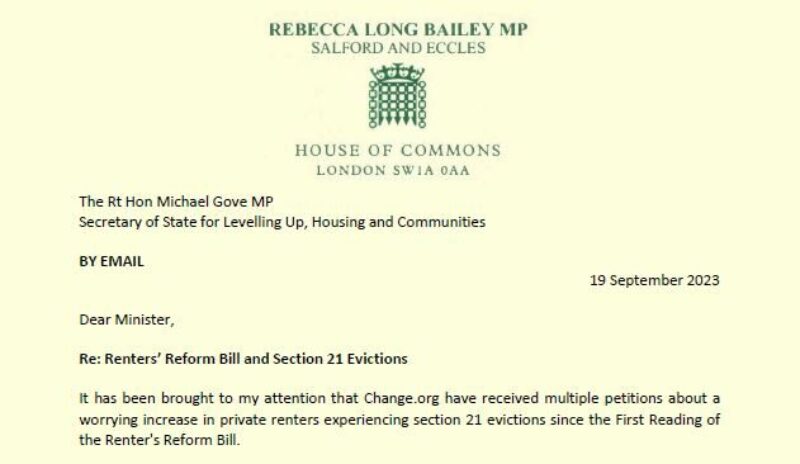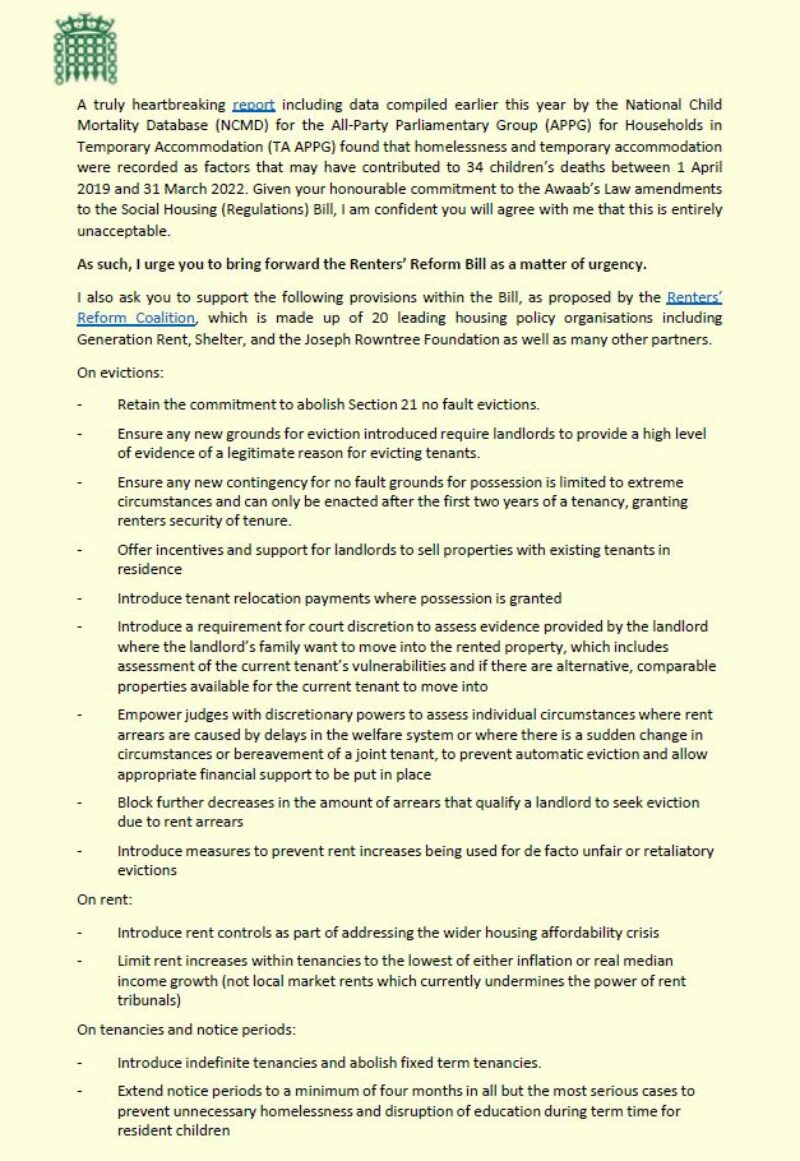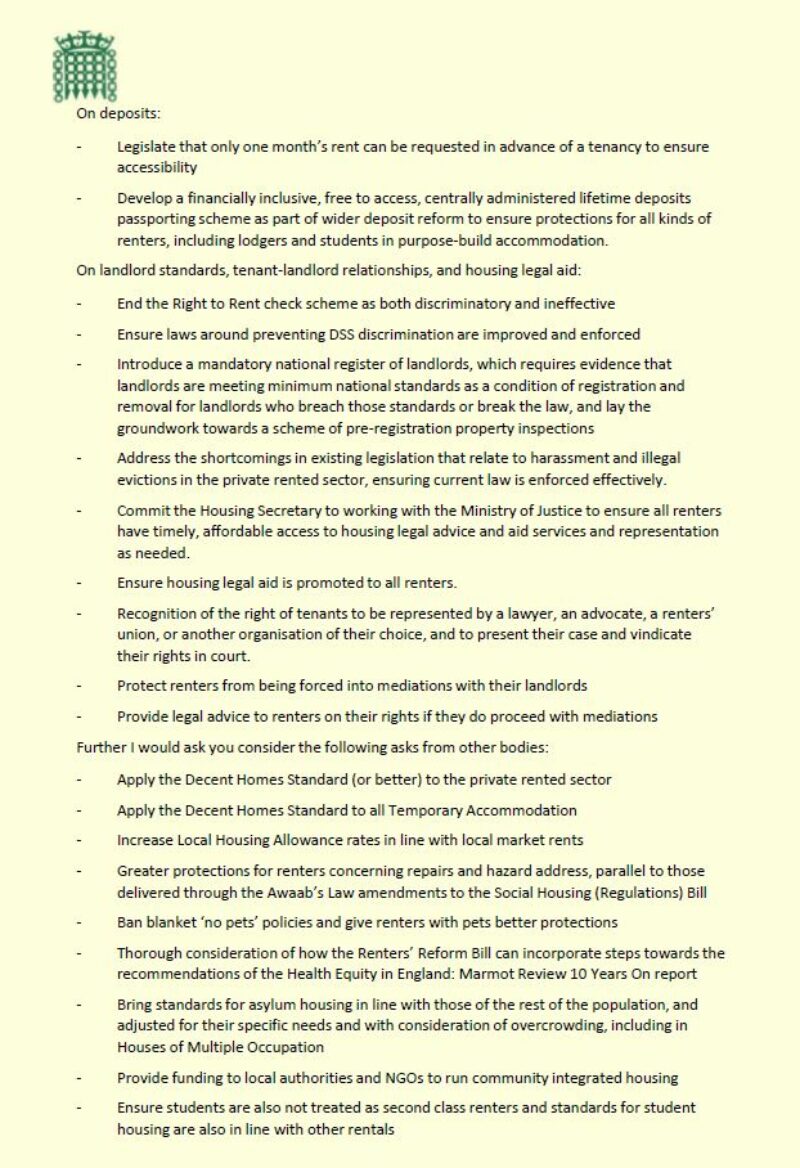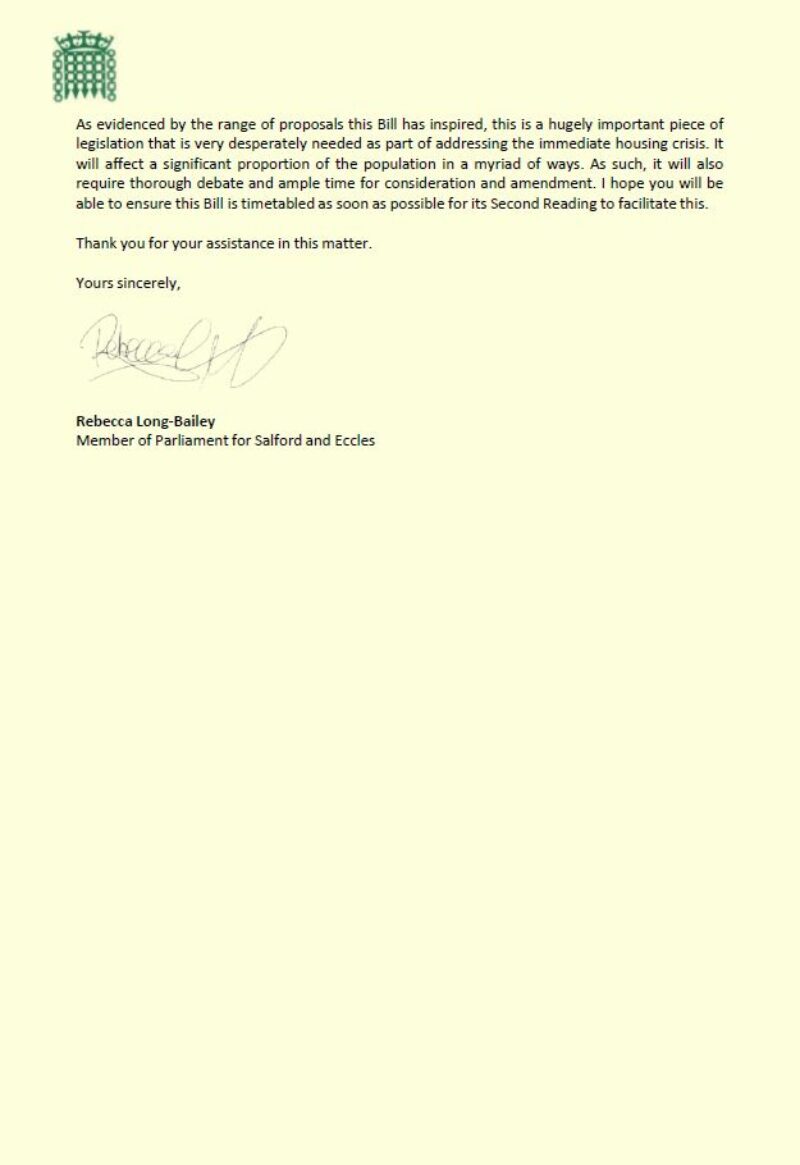Rebecca Long-Bailey MP for Salford Putting Salford First
Renters are facing unrealistically expensive rents yet failing housing quality. It’s been 4 months with no progress on the Renters’ Reform Bill despite the national housing crisis & rising homelessness. It needs to be debated urgently to reform the private rented sector.
My letter to The Secretary of State for Levelling Up, Housing and Communities, Michael Gove MP
19 September 2023
Dear Minister,
Re: Renters’ Reform Bill and Section 21 Evictions
It has been brought to my attention that Change.org have received multiple petitions about a worrying increase in private renters experiencing section 21 evictions since the First Reading of the Renter’s Reform Bill.
Investigating this, I found that the latest Ministry of Justice statistics show that while the number of “accelerated procedure” repossessions (which I understand represents stage four of eviction by bailiffs after a section 21 notice has expired and the tenant remains in the property) are now broadly comparable to pre-pandemic 2019 values, the number of accelerated procedure claims (i.e. stage one of the process) is significantly higher: There were 7491 claims by private landlords in Q2 2023 compared with 4850 claims in Q2 2019. I am gravely concerned that we will now see this surge in claims progressing through to actual repossession through section 21 proceedings.
As such, my first and immediate request is that you please urgently review this as a developing concern and consider what measures can be taken to mitigate for a ‘spike’ in pre-emptive section 21s being issued before the Renters’ Reform Bill can be passed. If this continues unchecked, this will only further exacerbate the immediate housing crisis and add to the strain on our already considerably backlogged justice system.
Notwithstanding this serious issue, it is absolutely critical that the Government deliver on the promise to end no fault evictions and bring forward the long awaited rented housing sector reforms through the Renters’ Reform Bill, as promised in the last, late Queen’s Speech. Of course, the longer the Bill is delayed, the longer the window for section 21s to be pre-emptively processed, but that is not the only issue, by far.
It is impossible to truly accurately measure homelessness but the Government’s quarterly statistics release for statutory homelessness assessments for January through March 2023 indicates that 41,950 English households were assessed as needing homelessness relief duty, an increase of 10.7% compared with the same quarter last year. This was alongside around 37,890 households needing prevention duty. These statistics do not reflect the true, larger total number of people rough sleeping or experiencing ‘hidden’ homelessness like sofa surfing.
In addition, on 31 March 2023, 104,510 households were recorded as being in temporary accommodation, which is an increase of 10.0% from 31 March 2022. The housing crisis is clearly escalating out of control.
A truly heartbreaking report including data compiled earlier this year by the National Child Mortality Database (NCMD) for the All-Party Parliamentary Group (APPG) for Households in Temporary Accommodation (TA APPG) found that homelessness and temporary accommodation were recorded as factors that may have contributed to 34 children’s deaths between 1 April 2019 and 31 March 2022. Given your honourable commitment to the Awaab’s Law amendments to the Social Housing (Regulations) Bill, I am confident you will agree with me that this is entirely unacceptable.
As such, I urge you to bring forward the Renters’ Reform Bill as a matter of urgency.
I also ask you to support the following provisions within the Bill, as proposed by the Renters’ Reform Coalition, which is made up of 20 leading housing policy organisations including Generation Rent, Shelter, and the Joseph Rowntree Foundation as well as many other partners.
On evictions:
- Retain the commitment to abolish Section 21 no fault evictions.
- Ensure any new grounds for eviction introduced require landlords to provide a high level of evidence of a legitimate reason for evicting tenants.
- Ensure any new contingency for no fault grounds for possession is limited to extreme circumstances and can only be enacted after the first two years of a tenancy, granting renters security of tenure.
- Offer incentives and support for landlords to sell properties with existing tenants in residence
- Introduce tenant relocation payments where possession is granted
- Introduce a requirement for court discretion to assess evidence provided by the landlord where the landlord’s family want to move into the rented property, which includes assessment of the current tenant’s vulnerabilities and if there are alternative, comparable properties available for the current tenant to move into
- Empower judges with discretionary powers to assess individual circumstances where rent arrears are caused by delays in the welfare system or where there is a sudden change in circumstances or bereavement of a joint tenant, to prevent automatic eviction and allow appropriate financial support to be put in place
- Block further decreases in the amount of arrears that qualify a landlord to seek eviction due to rent arrears
- Introduce measures to prevent rent increases being used for de facto unfair or retaliatory evictions
On rent:
- Introduce rent controls as part of addressing the wider housing affordability crisis
- Limit rent increases within tenancies to the lowest of either inflation or real median income growth (not local market rents which currently undermines the power of rent tribunals)
On tenancies and notice periods:
- Introduce indefinite tenancies and abolish fixed term tenancies.
- Extend notice periods to a minimum of four months in all but the most serious cases to prevent unnecessary homelessness and disruption of education during term time for resident children
On deposits:
- Legislate that only one month’s rent can be requested in advance of a tenancy to ensure accessibility
- Develop a financially inclusive, free to access, centrally administered lifetime deposits passporting scheme as part of wider deposit reform to ensure protections for all kinds of renters, including lodgers and students in purpose-build accommodation.
On landlord standards, tenant-landlord relationships, and housing legal aid:
- End the Right to Rent check scheme as both discriminatory and ineffective
- Ensure laws around preventing DSS discrimination are improved and enforced
- Introduce a mandatory national register of landlords, which requires evidence that landlords are meeting minimum national standards as a condition of registration and removal for landlords who breach those standards or break the law, and lay the groundwork towards a scheme of pre-registration property inspections
- Address the shortcomings in existing legislation that relate to harassment and illegal evictions in the private rented sector, ensuring current law is enforced effectively.
- Commit the Housing Secretary to working with the Ministry of Justice to ensure all renters have timely, affordable access to housing legal advice and aid services and representation as needed.
- Ensure housing legal aid is promoted to all renters.
- Recognition of the right of tenants to be represented by a lawyer, an advocate, a renters’ union, or another organisation of their choice, and to present their case and vindicate their rights in court.
- Protect renters from being forced into mediations with their landlords
- Provide legal advice to renters on their rights if they do proceed with mediations
Further I would ask you consider the following asks from other bodies:
- Apply the Decent Homes Standard (or better) to the private rented sector
- Apply the Decent Homes Standard to all Temporary Accommodation
- Increase Local Housing Allowance rates in line with local market rents
- Greater protections for renters concerning repairs and hazard address, parallel to those delivered through the Awaab’s Law amendments to the Social Housing (Regulations) Bill
- Ban blanket ‘no pets’ policies and give renters with pets better protections
- Thorough consideration of how the Renters’ Reform Bill can incorporate steps towards the recommendations of the Health Equity in England: Marmot Review 10 Years On report
- Bring standards for asylum housing in line with those of the rest of the population, and adjusted for their specific needs and with consideration of overcrowding, including in Houses of Multiple Occupation
- Provide funding to local authorities and NGOs to run community integrated housing
- Ensure students are also not treated as second class renters and standards for student housing are also in line with other rentals
As evidenced by the range of proposals this Bill has inspired, this is a hugely important piece of legislation that is very desperately needed as part of addressing the immediate housing crisis. It will affect a significant proportion of the population in a myriad of ways. As such, it will also require thorough debate and ample time for consideration and amendment. I hope you will be able to ensure this Bill is timetabled as soon as possible for its Second Reading to facilitate this.
Thank you for your assistance in this matter.
Yours sincerely,
Rebecca Long-Bailey
Member of Parliament for Salford and Eccles




